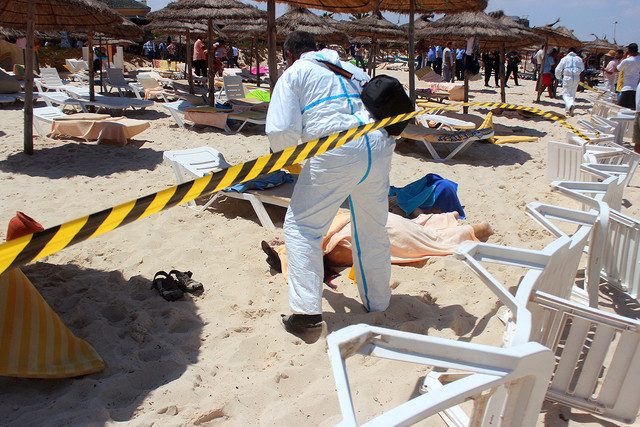SUMMARY
This is AI generated summarization, which may have errors. For context, always refer to the full article.

LONDON, United Kingdom – (UPDATED) Britain was in shock Saturday, June 27, as it braced for news of further casualties from the bloody attack on a Tunisian beach resort, which has already caused the worst loss of British life in a terror incident since the 2005 London bombings.
Tunisian authorities said they had identified at least 8 Britons among the 38 killed by an Islamist gunman on Friday, but Prime Minister Habib Essid said most of the dead were believed to be British.
British Prime Minister David Cameron also warned the death toll would rise. He said: “I’m afraid that the British public need to be prepared for the fact that many of those killed were British.”
As the grim process of identifying the bodies continued, travel firms began repatriating thousands of British tourists from beach resorts around the attack site near Sousse, about 140 kilometers (87 miles) south of Tunis.
There are currently about 20,000 British tourists on package holidays in Tunisia, according to ABTA, the country’s largest travel association.
Cameron said the government would “do everything necessary to get people home,” and as well as providing consular assistance, had deployed police and Red Cross experts to the north African country.
Among those caught up in the massacre at the 5-star Riu Imperial Marhaba Hotel, in the popular resort of Port el Kantaoui, were tourists travelling with TUI UK group operators Thomson and First Choice.
TUI sent 10 planes on Saturday to repatriate about 2,500 customers, and said it was cancelling all its holidays to Tunisia for the next week.
The attack made front page news in all of Britain’s newspapers on Saturday, with headlines such as “Slaughter on the beach” accompanying stark photographs of bodies lying in the sand covered by beach towels.
The attack is the deadliest terror incident for Britain since 52 people were killed by 4 suicide bombers in an attack on the London transport system on July 7, 2005.
Many papers carried the tale of 30-year-old Matthew James, from Wales, who was shot 3 times – in the shoulder, chest and hip – while trying to protect his fiancee, the mother of his two children. Miraculously, he survived.
‘Innocent holidaymakers’
The mass shooting, the deadliest in Tunisia’s recent history and the second attack on tourists in the country within 3 months, was claimed by the Islamic State of Iraq and Syria (ISIS) jihadist group, which controls large parts of Iraq and Syria.
The attack came on the same day that 26 people were killed at a Shiite mosque in Kuwait, in a bombing also claimed by the ISIS group, and the same day that a suspected Islamist attacked a factory in France. (READ: World leaders condemn string of ‘barbaric’ attacks)
Cameron on Saturday chaired a meeting of the British government’s Cobra emergency committee and has spoken to the Tunisian president.
“These savage terrorist attacks in Tunisia, Kuwait and France are a brutal and tragic reminder of the threat faced around the world from these evil terrorists,” he said in a televised statement from Downing Street.
Cameron said the victims in Tunisia were “innocent holidaymakers relaxing and enjoying time with their friends and families.”
“These terrorists will not succeed, for as much as they try to divide people they will only unite us more strongly in our determination to defeat these Islamist extremists and all they stand for,” he said.
Britain’s terrorism threat level is currently at severe, the second highest of 5, but security was stepped up at major public events this weekend, including armed forces day celebrations and London’s gay Pride march.
The Tunisia shooting followed a March attack claimed by the ISIS group on Tunis’s Bardo National Museum that killed 21 foreign tourists and a policeman, and comes as a further blow to the country’s tourism industry.
Tourism accounts for 7% of Tunisia’s gross domestic output and almost 400,000 direct and indirect jobs. – Alice Ritchie, AFP/Rappler.com
Add a comment
How does this make you feel?
There are no comments yet. Add your comment to start the conversation.